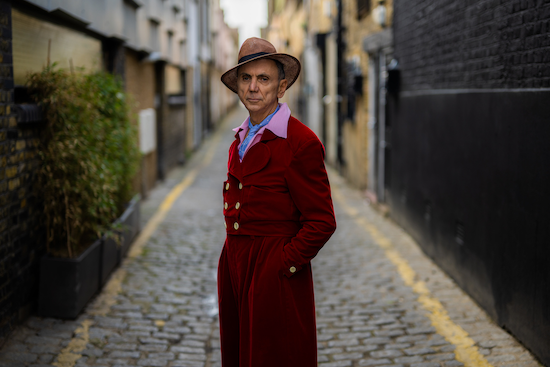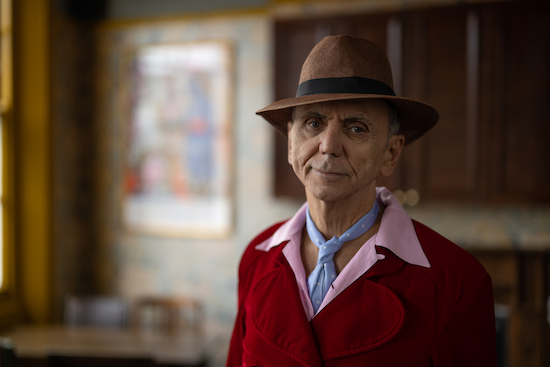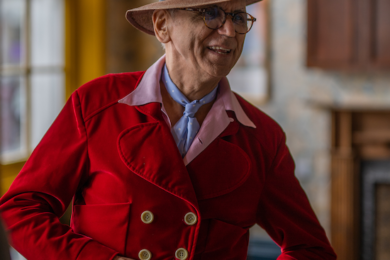“I wish I never had a past,” Kevin Rowland confesses. “It almost dragged me down.” It’s a sentiment he’s routinely expressed before: wanting to break free of the ways his career has often been pigeonholed into the hits birthed by Dexys Midnight Runners records like the northern soul and Stax-influenced Searching For The Young Soul Rebels or the Celtic folk stylings of Too-Rye-Ay. In our interview, Rowland has begun reflecting on My Beauty, his 1999 album consisting of reinterpretations of songs he found personal meaning in over the years, which faced its harshest contemporary backlash for his attire – dresses with stockings and lingerie.
He ascribes the reaction to the preconceived notions Dexys had put upon him: “I wasn’t thinking about the past, but I’d be turning up to interviews and they were asking about some track I did 15 years earlier. They were shocked at what I was wearing because they were comparing it to what I used to wear, but there were 15 years in between. I just felt like a new artist. To me, there was no continuation.” After pausing mull over his thoughts on the matter, he adds: “If anything, I react against what I did in the past.”
The 2020 reissue of My Beauty explicitly dealt in reexamining this element of Rowland’s image in a modern lens, down to a new video for ‘Rag Doll’ about how attitudes toward gender presentation outside the norm shifted since the record’s initial release. It seems only fitting to dig further into this with Rowland, given my background as a trans writer. I ask for Rowland’s perspective on how he has observed times changing since 1999, especially with the gradual creep of anti-trans movements taking aim against all kinds of gender nonconformity since 2020. (At the moment, anti-trans oppression seems to keep finding institutional support internationally, including a recent suggested challenge to the legal definition of “sex” within the Equality Act that would only restrict rights further.)
His response is carefully measured, noting how public acceptance seems to “swing in another direction” from era to era. “We had the ‘80s, and there was a lot of mixing up stuff,” Rowland muses. “I imagined it would’ve stuck, but it didn’t seem to stick by the 90s.” Making note of the reactionary response to the open flamboyance of 80s artists, he adds, “It must have triggered something in them.”
Rowland sees echoes in the rise of anti-trans hate groups so far this decade. “It seemed like things had gotten a lot better,” he continues, talking about the widespread praise the ‘Rag Doll’ video received, prominently featuring Rowland’s grandson Roo, who had been wearing dresses and makeup since teenage years and carries himself with the same pride on camera. “But, in the last three years, certainly my experience has been that the whole anti-trans thing has gotten a lot louder.”
This all feels doubly pertinent with the latest Dexys record The Feminine Divine, a conceptual album about Rowland’s own shifting views toward femininity in recent years. For one thing, the band’s newest video for ‘My Submission’ finds Rowland openly dressing outside gender norms again, this time in a red velvet dress, garter and stockings, and wig, looking more content with this presentation and the freedom it represents than ever. It’s a production just as liberating as My Beauty was, personally-driven and unconcerned with what those who primarily associate Rowland with denim overalls or Ivy League-sharp business suits may think.
It strikes me that Rowland’s eager embrace of this personal femininity is especially powerful knowing how My Beauty’s reception drove him away from being open with that manner of dress for years. I ask if revisiting My Beauty spurred the reflexivity Rowland brings to this subject on The Feminine Divine and the ‘My Submission’ video, but he explains that it was just that the rerelease simply happened to fall at an auspicious time. “I was already getting interested in my own femininity before 2020,” he elaborates. As he speaks about the video, his resolve in this form of self-expression is stronger than ever, emphatically uncompromising. “If you don’t like that, then fuck off,” he says with a smile.

Clad in a simple striped shirt and speaking with his back to a bare wall during our Zoom call, Rowland holds himself with the forthright honesty he puts into his every answer. He isn’t afraid to speak bluntly and openly about his difficulties across the decades – in being understood by others, or finding the personal fulfillment and change he spent decades searching for. But he does it with a renewed confidence in himself and his place in life, even when that confidence extends to telling off naysayers who only value artistic stagnation. “They’re usually just guys who want to go back to 1981 anyway, and I’m not interested in that,” Rowland adds. “They try to define what Dexys should be, but we’re changing all the time. I’d be happy to say adios to some of those guys.” He also jokes about prodding the fragile egos of these entitled listeners on the band’s social media: “If somebody puts a really negative comment, I put a like on it sometimes. One bloke came back with, ‘It wasn’t supposed to be a compliment!’ And I put a like on that as well.” He breaks into a gleeful bout of laughter, carrying with it his unbridled freedom from those who never had his best interests in mind.
At its core, The Feminine Divine follows the guiding star of personal healing above all else, no matter what new ground Kevin Rowland traverses to get there. Instrumentally, the record incorporates electronic elements for the first time in Dexys’ catalogue, an attribute Rowland weds to the album’s back half as “the femininity starts to come in.” In that span of the record, Rowland also embraces lyricism about sexuality in a manner more upfront than ever before, uninhibited in how he writes about gendered power reversals in the bedroom and giving himself completely to women. He recalls an initial apprehension in recording the vocals for the submissive songs ‘My Goddess Is’ and ‘Goddess Rules’ in bandmate Mike Timothy’s place, but one that gave way to excitement when letting loose. “Mike didn’t know what the songs were about – I hadn’t spoken to him about them. So I’d first be humming the words as we were getting the sound sorted out. I was thinking about what others would think. But I knew I had to do it, so I just got on with it.’”
Equally significant to Rowland was embracing this openness in sexuality as a means to undo the cloistered sense of shame that his Catholic upbringing left him with. “The school didn’t give me any sexual education – not even biology,” he recalls. “My parents didn’t tell me anything. This thing happening in the body was a secret. The only ones you talked to were your friends at school. It felt like a good thing, but you’ve been told by the silence that it wasn’t a good thing. In fact, it wasn’t even supposed to be happening. I went into life with that screwed-up attitude. It’s a bloody awful way to live.”
It’s here where Rowland’s repeated emphasis that what he does is driven by personal need, rather than what it may do for his music, becomes especially crucial. “If I’m going to write about myself,” he explains, “then I’ve got to live.” Describing working to undo the damage repression had left on him for decades, he says, “I didn’t want it to be about what I produced. It was about me. I’m definitely a work in progress, but I feel freer in sexuality than ever before.”
What appears on the record isn’t necessarily a conscious choice to subvert the past, though: nearing 70, Rowland considers his output with Dexys’ original run in the 1980s as penned by “somebody else,” a completely alien perspective to who he feels he is now. “I completely forget the past,” he continues. “I do think about it – too much sometimes. But that’s gone for me now.” When discussion drifts toward The Feminine Divine’s opener ‘The One That Loves You’, written in 1991 with lyrics like “I’m your man and I’ll die to defend you," Rowland elaborates how including the track illustrates the complete 180 he made on his possessive impulses with women: “I’m embarrassed to admit it now, but that was my position: you’re my girlfriend, and if anybody else tries it on with you, there’s gonna be trouble.” Laying this card on the table first, therefore, became the foundation the rest of the record works to undo, placing the listener in Rowland’s own evolving outlook since the song’s conception.
Throughout our chat, Rowland exudes a comfort in himself and the joviality he describes working hard to achieve, following years of personal hardship and dispirited outlooks. The 90s, especially, were tough on Rowland, who struggled with addiction to cocaine and spent a brief period of time in the Indian doomsday-prophesying sect Brahma Kumaris after coming across a poster in Willesden advertising meditation sessions. Instead of finding the spiritual fulfillment and bodywork he needed, though, the Brahma Kumaris only exacerbated Rowland’s own internalized shame with their steadfast belief in celibacy. “I was already a guilt trip Catholic feeling bad about sex,” he reflects, “so I was fertile ground for the Brahma Kumaris.”
True to his place in life at the moment, Rowland is able to see these breaking points for the growth they afforded him, calling his lowest times “the best thing that ever happened” to him. “Nobody changes unless they have to,” he explains. During 2016, another rocky period for Rowland, his mother passed away, and the press surrounding Let The Record Show, an album of reinterpretations of Irish songs, began to burn him out. “ I wasn’t very enthusiastic about life,” he continues. “There was no vitality.”
Like his point of crisis in the ‘90s, Rowland sidelined music entirely to try to find healing on his own terms – something he found much greater success with through time in Thailand. Drawn to teachings of the Tao and Tantra, he grew to be on better spiritual terms with himself and his body than he had during his time with the Brahma Kumaris – calling this experience “much more free, much more accepting.” “I liked the way the Tantra and the Tao use sexual energy in a positive way,” Rowland mentions. “They believe it’s a healing force.” He adds that these philosophies’ work at identifying and releasing trauma in the body was especially significant to what he had been looking for, a process by which he could finally begin confronting the sexual repression he was taught as a child and rehabilitating his relationship to his own femininity, which he says he “battened down the hatches on not too long after My Beauty.” Even just a few years later, Rowland is awed at the substantial effect that his experiences with these teachings had on his outlook toward life: “I feel I can wear whatever I want and be however I want, and I don’t really care now what people think. That’s massive.”

It didn’t immediately come back to the music, though, and Rowland resented the insinuation that the work he needed to do on himself was a vessel for new material. “A teacher asked me what I do for a living,” he says, “and when I said I did music, he went, ‘When you learn this, you’ll be able to go back and do music in a new way.’ I almost said to him, ‘Fuck off.’”
It was only when Rowland asked Dexys’ founding member Big Jim Patterson for old tapes the two had recorded and saw the throughline of his own story in older tracks like ‘The One That Loves You’ and ‘It’s Alright Kevin (Manhood 2023)’ that his time to himself began spilling out onto the page. The Feminine Divine’s title track arrived fully formed, he notes, without much conscious thought – everything from Rowland’s recent years in recentering his way of thinking about femininity, as it applies to himself and the women in his life, tumbling out now that he became more open with himself.
That, ultimately, is what Kevin Rowland notes is vital to his certainty about putting these sentiments to Dexys’ name. “My job is to be true to it,” he says about the prevailing ethos of the band over the decades. “I’m prone to being dishonest, or people-pleasing for an easy life, or avoiding confrontation in my own life. But with Dexys, it’s the very best of me and the people involved. I hold the honesty and being genuine very dear.” Whether that’s in the frank nature of the lyrics of The Feminine Divine or Dexys’ tendency for spoken word – inspired by Rowland’s love of classic soul records from Barry White and The Chi-Lites for utmost verbal directness – the sincerity has never faltered.
Though he reiterates that The Feminine Divine was a record he made for himself and his self-expression first and foremost, Rowland brings the conviction that drives Dexys to his hopes for how listeners see the band’s current era as forward movement: “I hope it stops people trying to put us in a box – even fans. We can do whatever music we like, and we can wear whatever we like. We’ve tried to make every album different, and for as long as we’re doing this, we’ll continue to do that.”
As we talk about the record’s vulnerable lyricism on sexuality and gender, Rowland speaks with a clear-headed assuredness, bold as any statement he’s ever made: “Whatever I was doing in the past, I felt equally strongly about it. Otherwise I wouldn’t have been doing it. And this is what I feel strongly about now.” With the past Rowland has had, there’s no freer expression than that – artistic or personal.
Dexys’ new album The Feminine Divine is released July 28 via 100%



